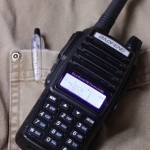Living in Hawaiʻi you pick up a few additions to your vocabulary. For centuries the islands have been a stew of languages, each borrowing words from one another. Hawaiian, Portuguese, Chinese, Japanese, English, Spanish and more have all added to the flavor of these islands. Everyone uses a few words from other languages in everyday conversation. Then there are local folks who grew up speaking the full mixture, a pidgin unique to the islands.

Some of the words that Hawaiian supplies seem much better than the English equivalents, it is understandable that they are used in preference to the English words. Some are simply more appropriate on an island… Mauka and Makai make perfect sense where everything is either towards the mountain or towards the sea. Puʻu us the perfect name for the numerous volcanic hills that dot the island. Puka, for small hole, just sounds right.
My favorite is Pau, meaning finished or done, a word that is commonly heard on the Keck radio channels. “How are you guys doing up there?” might go the radio chatter, “We all pau!” Something about the word just works, the sound and the meaning in agreement.
I expect these words will stay in my vocabulary, alongside British expressions I picked up living in England decades ago. Language is a fluid and dynamic thing, part of the richness of our lives.


When I was smaller, my pidgin was so thick that when I changed schools my teachers couldn’t understand me. Unfortunately, the language I spoke when I was younger is gone, never to return. I can still shift back and forth, but the true pidgin, da kine, is gone.
I mourn the loss of that true creole, the kids nowadays think they are speaking pidgin, but like any language, I suppose, it has evolved.
I often wonder if it has endured on the other islands, away from the influence of the ‘big city.’ I hope and dream that the kapakahi I once conversed in is alive and well, somewhere.
As a mainland transplant who teaches here this is important for me to hear. In education we strive for “academic language” so to speak for things like learning reading with the little ones, but after hearing this I’ll make sure my students know it’s ok to talk how they talk. Especially during bonding and less structured times. Maybe during lessons we use full English but no need during socializing. I will look more in to pidgin! I only have a few local Hawaiian kine but we treat Marshallese as English language learners so those who know pidgin and English should be celebrated as dual language and encouraged to use both! It is a gift to know more than one language and especially one as unique as pidgin!!!
r u pau talkin about dis or what? Shoots!